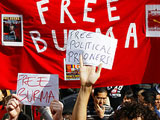Clouds of War over Burma
By Simon Roughneen for ISN
Recent external pagefighting in northern Burmacall_made sent over 35,000 refugees into China, prompting fears that the ruling junta is seeking a military solution to its recent demand that 17 ethnic militias based in Burma's borderlands merge with the state security forces before 2010 elections.
Over the weekend of 28 August, the junta's army overran territory previously controlled by one of the militias, the external pageMyanmar National Democratic Alliance Armycall_made, comprised of external pageKokang-Chinesecall_made who have been in the region for decades. The group - like many of the other militias in the borderlands - is thought to be involved in the 'Golden Triangle' drug trade.
The fighting came just days after US external pageSenator Jim Webb's visit to Burmacall_made, where he met the junta's leader, General Than Shwe, and opposition leader Aung San Suu Kyi. Despite US and international condemnation of sentencing of Aung San Suu Kyi to another 18 months house arrest on 11 August, Webb got little by way of concessions from the junta. He secured the release of John Yettaw, the apparent guilty party in the case that saw Suu Kyi found guilty of violating her original house arrest terms. However, as things stand, the junta will proceed with elections scheduled for 2010, without Suu Kyi, without her National League for Democracy (NLD) and without the 2,100 political prisoners currently in jail in Burma.
Webb since penned external pagean op-ed in the New York Timescall_made, pushing his view that the US should engage with the junta, which in turn has drawn scorn from Burmese exiles, who cite remarks by Suu Kyi's lawyer countering Webb's statement that she would consider supporting reduced sanctions on the junta.
The sharpest rebuttal of Webb's Burma dealings came in external pagea piece by U Win Tincall_made, a respected figure of the NLD - Burma’s main opposition party - and former political prisoner, published in The Washington Post on 9 September.
The US is currently undertaking a review of its Burma policy, with the results of this expected soon. Webb briefed US officials upon his return from Southeast Asia, including Secretary of State Hillary Clinton.
US statements and actions on Burma have been muddled in recent months, with Clinton suggesting engagement mere days before external pageObama renewed Bush-era sanctionscall_made on the Generals and their acolytes. The junta has not given in to any US conditions, such as releasing Suu Kyi and the other political prisoners, but it has portrayed Webb's visit to Burmese - who lack access to external news information - as a signal that the junta's political strategy is gaining international legitimacy.
China and Burma
Beijing has multiple trade and investment links with Burma, expanded since the West imposed sanctions, and in turn supports the junta internationally, stalling or undermining UN Security Council resolutions condemning the various abuses perpetrated by the military rulers. Just days before the Kokang offensive, China said that Burma's decision to convict Suu Kyi was an internal matter.
However, the fighting in the north shows that the junta is capable of external pagesnubbing its chief allycall_made and military supplier, China, when domestic push comes to shove. Beijing reprimanded the junta, after the brief fight with the Kokang, who are remnants of the former Burmese communist rebels once allied with their Chinese comrades.
The junta may be sending the Beijing politburo a signal that it has other allies and business partners, and that a changed US policy could be in the offing.
As external pageWalter Lohman of the Heritage Foundationcall_made put it to ISN Security Watch, “There has been some speculation that the junta seized on Webb’s visit because they are beginning to resist the Chinese presence.”
Brute force
The junta is chiefly concerned with its domestic policy ahead of 2010 elections. Firstly, by keeping Suu Kyi locked up and the NLD outside the electoral process, it can avoid the 1990 scenario, when it annulled the election results won handsomely by the NLD, and give a veneer of legitimacy to a deeply flawed constitutional and electoral process.
Second, the attack on the Kokang could be a sign to the 16 other ethnic militias and armies that it if they do not participate in the revamped security forces - which effectively would end their autonomy and access to income (mainly drugs-based) - the junta will fight them to get the result it wants.
K Yhome, a Burma analyst at the external pageObserver Research Foundationcall_made, told ISN Security Watch that “when it comes to Myanmar’s internal politics, the junta seems to take the calls based on how they view things.”
Already, other ethnic militias are gearing up for attack by the army. The 16 other groups vary in size, cohesion and weaponry, but some - such as the external pageUnited Wa State Armycall_made and the Kachin Independence Organization - have foot soldiers estimated at around 30,000 and 15,000, respectively.
All in all, non-Burmese minorities make up around 40 percent of the country's population. At no time in the country's post-independence history has central control been asserted over the entire country, despite scorched earth campaigns across minority regions.
The junta would have a fight on its hands to defeat these groups conclusively, not least if Beijing worries that a renewed war would jeopardize its existing and proposed oil, gas and hydroelectric investments.
Then again, China may be happy if the junta can prosecute a quick, easy win, and establish state control over the borderlands, ensuring vigilance over a external pagemassive new port and pipeline projectcall_made linking Burma's coast to Yunnan province in China. The pipeline will run close to the region that the army took from the Kokang recently, forcing the refugees from that fighting to flee to Yunnan.
“Brute force is the junta’s ultimate arbiter in both interethnic relations and imposition of its new constitution. It makes 'offers you can’t refuse,'” Lohman told ISN Security Watch.

